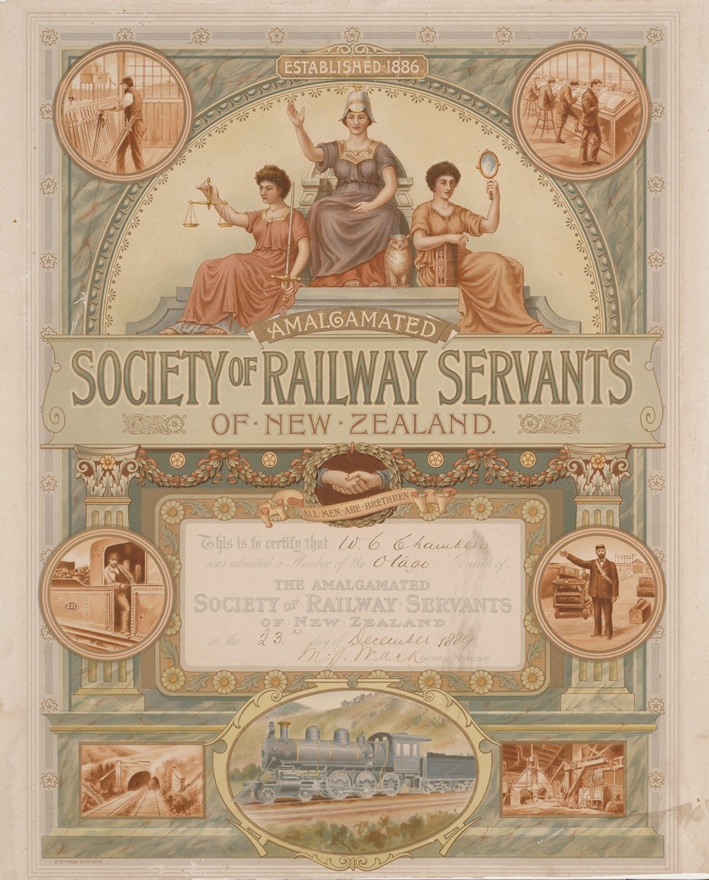
A membership certificate issued by the Amalgamated Society of Railway Servants (ASRS) and signed by M.J. Mack, the union’s general secretary from 1908 to 1926.
The railways workforce was heavily unionised. In 1914 New Zealand Railways (NZR) staff were represented by three unions: the quaintly named ASRS, which had been formed in 1886; the Engine Drivers’, Firemen and Cleaners’ Association (EFCA), which had broken away from the ASRS in 1908-10; and the smaller, white-collar Railway Officers’ Institute.
The ASRS was New Zealand's largest trade union – in 1914 it had over 8000 members and more than 40 branches – but it was a cautious organisation. A government superannuation scheme and statutory grading, pay and promotion structure helped insulate railway workers against the contagion of industrial militancy. The ASRS and EFCA refused to join the waterfront and general strikes of late 1913, and in return for their neutrality were able to extract further concessions from the government.
Throughout the First World War the ASRS was led by Joe Mack, an unassuming former NZR porter who proved to be a skilful and determined unionist. Mack was a devout Christian, an ardent prohibitionist and a strong supporter of the British Empire. He and his executive accepted the government’s decision to introduce conscription in 1916, and from January 1917 he served on one of the Wellington Military Service Boards, which heard appeals against conscription.
Mack was dismayed by the New Zealand Labour Party's opposition to conscription, and controversially contested the Wellington Central by-election in 1918 against Labour's Peter Fraser. Although he presented himself as an independent representing 'reasonable Labour', Mack was endorsed by the sectarian Protestant Political Association (PPA) as 'a Protestant who can sing the National Anthem, loyal and patriotic'; Fraser, the PPA thundered, stood for 'Bolshevikism in New Zealand'. Labour supporters, including some ASRS members, condemned Mack for splitting the workers’ vote and for his PPA links. He polled a creditable second, beating the government candidate, but Fraser won with ease.
During the war the railway unions regularly pressed the government to address the spiralling cost of living, and sought war bonuses for their members (with some success – all staff received an increase in 1916 but in 1917 the department granted a bonus to lower-paid married men only). With the coming of peace, members' expectations rose. When W.F. Massey's Reform government refused to grant an increase in early 1920, railway workers went on strike for the first time in 30 years. The stoppage was timed to disrupt the Prince of Wales' tour, and the government quickly conceded. Later that year Mack was elected president of the New Zealand Alliance of Labour, an umbrella organisation dominated by transport unions; despite ideological differences he worked closely with its more militant secretary, 'Big Jim' Roberts.
In 1922, during the sharp post-war economic downturn, the government cut state servants' wages by up to 10%. After exhausting other means of protest ASRS members voted to strike, against Mack's advice, in April 1924. EFCA members stayed at work, however, and the strike was crushed within a week. The government forced the ASRS to leave the Alliance of Labour and officially recognised the Railway Tradesmen’s Association as a separate union for workshops’ staff. Mack resigned as general secretary of the ASRS at the end of 1926. He died in 1951.

Community contributions